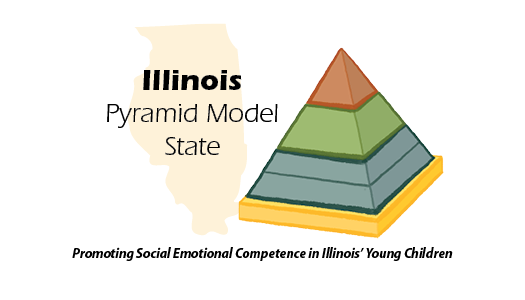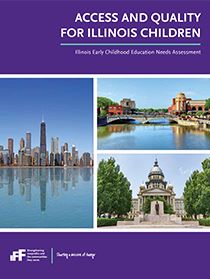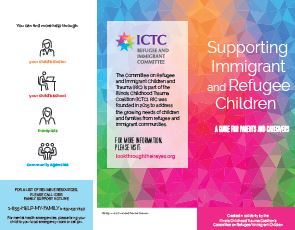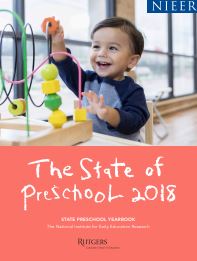Alignment. Quality. Access.
GOECD leads the state's initiatives to create an integrated system of quality early learning and development programs to help give all Illinois children a strong educational foundation before they begin kindergarten.
Learn more.
|
Executive Committee Meeting
|
|
|
GOECD welcomes Deborah Hwang!
Deborah Hwang joined GOECD in May of 2019 as the Preschool Development Grant Birth Through Five (PDG B-5) Coordinated Intake Strategy Manager for the Maternal, Infant, and Early Childhood Home Visiting Program (MIECHV). Funded by PDG B-5, this position will work with diverse state- and community-level stakeholders to develop a written strategic plan for expanding centralized or coordinated intake for B-5 programs in Illinois, including home visiting. This plan will utilize data and research, building on reports and documents from Illinois' MIECHV, Race to the Top-Early Learning Challenge, and Preschool Development Grant-Expansion projects. Deborah holds a Master's from the University of Chicago School of Social Service Administration, and she brings experience in quantitative and qualitative research as well as from the foundation world.
|
Michael Abel Elected to NAEYC Affiliate Advisory Council
Congratulations to Michael Abel for being elected to the National Association for the Education of Young Children (NAEYC) Affiliate Advisory Council. Mike is the Director of Research and Evaluation at the McCormick Center for Early Childhood Leadership at National Louis University and also serves as the Illinois Association for the Education of Young Children Regional Delegate Vice President. He is one of six new members elected from across the nation. The Council advises the NAEYC Governing Board and national staff about issues related to Affiliate and members, and help identify and develop strong, inclusive leadership.
|
Preparing for the 2020 Census
An estimated 5% of children under age 5 were not counted in the 2010 Census. That's about 1 million young children, the highest of any age group. An accurate Census count is critically important because the Census determines, among other things, how over $675 billion in federal funding is distributed across the country.
Click here
to read and download a fact sheet on Counting Young Children in the 2020 Census;
click here
to download other resources to help you and your community prepare for the 2020 Census.
|
Pyramid Model Builds Foundation in Illinois
 In 2017, Illinois began its much anticipated journey into implementing the Pyramid Model across the state. While the journey is in its early stages, much has been accomplished since the project was launched, specifically around (a) the training of trainers and direct service providers across the state; (b) building collaborations with key stakeholders; and (c) implementing a multipronged plan to ensure that the Pyramid Model work will continue to grow and sustain for years to come. The State Leadership Team has created a poster to highlight the accomplishments since its beginning. The poster identifies building capacity in T/TA, building collaborative systems, and building capacity in programs to implement the model program wide. Click here to view the poster.
In 2017, Illinois began its much anticipated journey into implementing the Pyramid Model across the state. While the journey is in its early stages, much has been accomplished since the project was launched, specifically around (a) the training of trainers and direct service providers across the state; (b) building collaborations with key stakeholders; and (c) implementing a multipronged plan to ensure that the Pyramid Model work will continue to grow and sustain for years to come. The State Leadership Team has created a poster to highlight the accomplishments since its beginning. The poster identifies building capacity in T/TA, building collaborative systems, and building capacity in programs to implement the model program wide. Click here to view the poster.
|
Access and Quality for Illinois Children: Statewide Early Childhood Education Needs Assessment

The Access and Quality for Illinois Children: Statewide Early Childhood Education Needs Assessment is a statewide needs assessment that examines access to quality early childhood education (ECE) services, including both home-and center-based care and preschool programs. The assessment was conducted by the IFF Research & Evaluation Department with funding provided by The Pritzker Children's Initiative.
The goal of the report is to inform stakeholders of the disparities in access across communities in the hopes of serving the greatest number of children in need of care with the highest quality of care. Stakeholders can use the information presented to create a comprehensive, high-quality, equitable strategy for children throughout Illinois as well as reflect on targeted geographic strategies.
The report highlights the counties with the most limited access to ECE in order for investments and improvements to reach the areas with the greatest need. An additional report prepared by the Erikson Institute helps to build on the trends in access and quality identified in this needs assessment. Review the IFF report and recommendations here.
|
Home Visiting Task Force presents a Birth to Three Child Safety Resource Guide
A new
Child Safety Resource Guide is available for home visitors and other birth to three providers! The Illinois Home Visiting Task Force (HVTF) convened a Child Safety Ad Hoc Group starting on September 20th, 2018, to devise a plan for collecting and disseminating resources on child injury prevention for Birth to Three providers. Members of the group submitted resources, which were reviewed, catalogued, and prepared for distribution in the guide and at the bottom of this
webpage. These materials include training information for home visitors and other providers, which can be discussed with and reinforced by their supervisors. Also included are handouts that can be shared with parents and caregivers. Please share these resources widely with home visitors, other birth to three direct service providers, and their supervisors!
|
Supporting Immigrant and Refugee Children: A Guide for Parents and Caregivers

The Illinois Childhood Trauma Coalition's Refugee and Immigrant Children (RIC) Committee is excited to share a
new resource created in solidarity with the refugee/immigrant community.
Why? We know that messages in the media and recent policy changes have created a culture of fear and uncertainty for refugees and immigrants in the United States. This has exacerbated the experiences of trauma and emotional distress faced by our children and families.
What is it? This resource was designed to help inform parents and caregivers about signs of stress in children, how to promote adaptive coping for their family, the importance of self-care, as well as where to get additional resources and support.
Intended Use: We intended this brochure to be used in a collaborative way where community providers and families can review this information together and reflect on how these coping skills can be utilized.
Next Steps: Please feel free to share widely. Translations are underway and will be distributed as soon as possible!
If you have any additional questions or feedback or would like to join RIC, please contact
[email protected]
|
Father Engagement in Home Visiting: Benefits, Challenges, and Promising Strategies

Early father involvement is important for young children's development and learning. Most early childhood home visiting programs target mothers for enrollment, but engaging fathers in services can help families achieve desired program outcomes. For example, mothers may be more engaged in and stay enrolled in home visiting services longer when fathers participate in visits and display positive attitudes.
Early father involvement also impacts their partners' behaviors and birth outcomes. When fathers are involved prenatally, mothers are less likely to smoke and use alcohol while pregnant and more likely to receive prenatal care. Babies are less likely to be born preterm, have a low birthweight, or die before their first birthday.
Fathers who engage in home visiting programs self-report:
- Improved knowledge of child development and positive parenting practices
- Better anger management, resulting in less physical discipline
- Stronger communication with their partners
- Greater connections to employment, educational opportunities, and other community services and resources
Fathers report seeing home visitors as trusted sources of information and valuing their services.
Read the Research Snapshot here
.
|
 The National Institute for Early Education Research (NIEER)
State of Preschool
yearbook is the only national report on state-funded preschool programs. This year's report includes a special section highlighting policies affecting state preschool teachers, as well as changes since 2002, when NIEER began tracking state preschool. The National Institute for Early Education Research (NIEER)
State of Preschool
yearbook is the only national report on state-funded preschool programs. This year's report includes a special section highlighting policies affecting state preschool teachers, as well as changes since 2002, when NIEER began tracking state preschool.
The State of Preschool 2018
annual report finds more children attending state-funded preschool programs across the US but funding failing to keep pace, resulting in low compensation for preschool teachers that too often undermines classroom quality. Click here to read the NIEER report including state profiles.
|
|
|